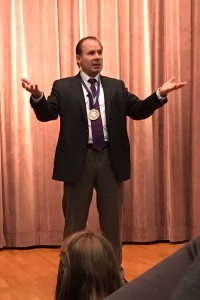
Flying Dog Brewery CEO Jim Caruso
By Tim Silvia//
As part of an ongoing effort to promote and educate on free speech, Hood College played host to Jim Caruso, CEO of Flying Dog Brewery, and his speech “Free Speech for Me, But Not For Thee?” The speech outlined the history of free speech in America and the challenges that truly free speech brings.
As a private institution, Hood has no obligation to provide students free speech. Regardless, Free speech is something that Hood College president Andrea Chapdelaine holds in the upmost importance.
“For me it is a core of a liberal arts education; that what is most important to me is for students to experience and learn and grow from here,” Chapdelaine said. “The opportunity to use their own voice, use their own mind, use their own talents and interests to learn. So that right to free speech, as I think about it, is so critical to fulfilling our mission.”
The president and, subsequently, the college’s dedication to the promotion of free speech were the main driving forces behind inviting Caruso to speak. Additionally, Chapdelaine awarded Caruso with the President’s Medal for Democracy for his work education the public on the principles of the First Amendment.
The speech came just months after the college found itself embroiled in its own free speech controversy, though the events of the spring and Caruso’s speech are unrelated. Hood narrowly avoided becoming one of a growing list of schools involved in a larger national conversation about free speech, hate speech and race.
This conversation is one that can become toxic very quickly, something that college president Andrea Chapdelaine experienced firsthand. During the weeks surrounding the college republican club’s controversial poster display, Chapdelaine says she found herself the subject of articles and social media posts accusing her of censorship and being intolerant of conservative speech.
In an anonymous survey of Hood students and alumni done for this article, almost two-thirds of respondents said that they feel the school is somewhere they can speak and express themselves freely, yet just over half feel that free speech is not promoted on campus.
When asked to follow up, most respondents said that the school’s handling of “Postergate,” the controversial display put up by the republican club and ensuing fallout, was the reason they feel free speech is not promoted. Additionally, a couple students relayed that they had observed professors and faculty “shutting down” students who presented opposing or controversial opinions.
Curtis Maples, a junior at Hood, experienced this firsthand his freshman year. According to him it happened during a class discussion regarding the military.
“I forget exactly what the conversation was about and his choice of words, but we were talking about the military,” said Maples. “Somebody said something offensive and another student, who had served, said something along the lines of ‘Why don’t you strap on your boots and go fight yourself then.’ The professor basically encouraged the first student to talk, but ignored the other one. When he [The second student] got up to leave the professor said something along the lines of ‘Go ahead and leave, see what I care, drop out for all I care.’ Another student called the student who left a pussy and the professor said they didn’t hear it.”
Hood graduate and attendee of Caruso’s speech, Ellie Blaser says she feels that free speech is alive and well on campus.
“While attending Hood, I never felt that I couldn’t speak up about certain issues,” she said, adding that her experience may not be reflective of the entire community, as she aligns with what she saw as the liberal political atmosphere on campus.
Nevertheless, Blaser expressed the importance of accommodating different opinions and views: “I think it was always clear that free speech was important on campus, but I also think that in the last year or so the concept of free speech has gained a new kind of urgency. Many people rightfully feel that free speech is under attack, which is why I think it is so important that Hood invited this speaker to the campus to show the school’s dedication to helping the concept of free speech flourish.”
Chapdelaine echoed this sentiment, saying: “Not only as a person, as an American in this democracy, not only can I not control somebody else’s speech, I should not because I believe in the first amendment. But, I certainly can control how I respond to it, I can hold people accountable if I feel, you know, their speech is harmful in some way.”
Donna Bertazzoni is a professor of journalism at Hood and teaches communications law, a class that works heavily with the First Amendment. She feels that free speech is as much a necessary right as it is a vital too for education.
“I think free speech is particularly important today, when we have a fractured media, people tend not to listen to or watch media that doesn’t agree with their own positions,” she said. “So free speech and, going along with that, a free press, makes a big difference so that people can have the best possible views, or at least have access to the best possible views about what’s going on in society.”
She feels the biggest threats to free speech are similar to those brought up by Blaser and Chapdelaine.
“People try to shut other people down,” Bertazzoni said. “People don’t listen. I think the issue of civility is important. We talk across each other, we don’t listen to what each other is saying. We are so busy formulating our counter-argument that we don’t spend the time to listen to what somebody is saying and understand their point of view.”
To view the full survey, click here: